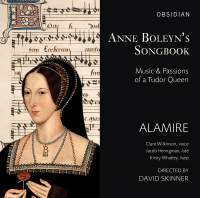Texte paru dans: / Appeared in: |
|
|
Outil de traduction ~ (Très approximatif) |
|
|
Reviewer: Barry
Brenesal To invoke the name of Anne Boleyn is to enter a realm inspired by fantasy—or at any rate, one strongly colored by the opinions of Catholic and Protestant propagandists, pro- and anti-Henricians, academicians, dreamers, the entertain-ment industry, and marketing firms. Separating fact from fiction is made more difficult not merely because source materials are often lacking or ignored, but because fictional romance sells big, and clings to its favorite subjects like limpets. At least in the case of the songbook recorded here, the idea that it had been compiled directly for Boleyn by the musician Mark Smeaton in the mid-1530s, a year or two before his execution (and hers) for alleged adultery and treason, has been laid to rest. It’s generally accepted now to have an earlier provenance, possibly commissioned for the marriage of Marguerite de Navarre to Charles IV, Duke of Alençon, in 1509. Presumably the book would have been given much later as a gift to Boleyn, who by then was a very well-regarded maid of honor in France, first to Queen Mary, and then to Mary’s stepdaughter, Queen Claude. When Boleyn traveled to England in 1521 the manuscript would presumably have traveled with her. It was in any case in her possession before 1529, pre-Smeaton, since her inscription in the book refers to herself as “Mistress Boleyn.” She stopped doing that the year after her father received two earldoms. The manuscript in fact bears three inscriptions. The first and most important from our perspective was added in what has been called a 16th-century hand, and states within the score of Compère’s Paranymphus salutat virginem, “M[ist]ris A Bolleyne nowe thus.” This quotes the motto of her father Thomas (“Now thus”), followed by three minims and a longa on what looks like a fanciful musical staff. Plenty of questions remain about the work (such as the identities of the songbook’s original sponsor and its five different scribes—especially the one that makes numerous mistakes of transcription, and the one that assiduously, even forcefully, corrects them), but though all are interesting, they’re not especially germane to a review of this recording. The songbook is currently designated MS 1070 in the Royal College of Music in London. It consists of 42 pieces, of which 39 are motets (two of them textless), and the remainder are secular chansons. The selection was made with discriminating taste, with Josquin represented by 10 pieces, Mouton by five, and both Compère and Brumel by three. Quite a few of the pieces would have been especially suited to Anne’s Marian sympathies. All would have been performable by the musicians, professional and amateur, that were part of Anne’s court; and the emphasis on voices of the same range and texture, as well as the dog-eared quality of many pages, suggests Boleyn’s female staff perhaps took part in singing these. The 19 selections David Skinner has chosen for this set are a cross section of its content: the known and unknown, sacred and secular, French- and Netherlands-influenced, selections frequently copied and currently found nowhere else. Nine items are anonymous, eight are unica, though there isn’t any falling off in quality from the standard set by the collection’s well-known masters. (It is difficult to escape the impression that Maria Magdalena et altera Maria, Popule meus quid feci tibi, and Forte si dulci Stigium boantem would be much better known today if not for their lack of attribution.) The outlier in this group is the song, O Deathe rock me asleep. Simply on the basis of a comment by a “judicious antiquary” who sold 18th-century music historian John Hawkins a copy of the work’s poem, the latter anointed Boleyn as its author more than 200 years after her death, without any research; and that became gospel to subsequent generations. From there, she was transmogrified for no discernable reason during the 20th century into its composer as well. The words are stiff, and the divisions above the ground are primitive. It wouldn’t be known today if not for Hawkins’s unreasoned acceptance, and the public’s continuing fascination with All Things Boleyn. Claire Witkinson does the honors on O Deathe, as well as the anonymous songs Venes regrets and Gentilz galans, and Sermisy’s Jouyssance vous donneray. Lutenist Jacob Heringman and harpist Kirsty Whatley perform O virgo virginum. The rest of the selections are handled expertly by 15-voice Alamire, one of the most active and attractive ensembles of its kind. Skinner has taken note in the songbook of its content’s frequent recourse to voice parts in the same or proximate register, as noted above, and used this cleverly to vary textures on the disc. The men as a result form a subset of the choir on a range of these selections, where their varied but darker coloration is especially impressive in Mouton’s Tota pulchra es and In illo tempore. The engineering supplies just enough “room” to make the voices and instruments sound, with excellent balance between voice parts, voice and accompaniment, or lute and harp. My only complaint about this release is its length. Note the timings: a two-disc set under 95 minutes. The album had yet to be released at the time of this review, so it’s still possible some lower than usual price might be attached to it. At full price I’d suggest the performances and content warrant the expense, but it’s a decision that all lovers of choral music from this general period are going to have to make for themselves. In any case, strongly recommended. | |
|
|
|
|
Cliquez l'un ou l'autre
bouton pour découvrir bien d'autres critiques de CD |
|




